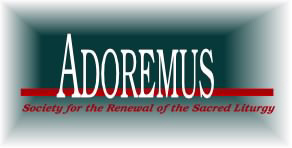
Adoremus, Society for the Renewal of the Sacred Liturgy
Congregation for the Doctrine of the Faith
Norms for Use of Low-gluten Bread and Mustum
August 22, 1994
In a 1994 letter to all bishops, Cardinal Joseph Ratzinger, prefect of the Congregation for the Doctrine of the Faith, responded to concerns about people with celiac disease and alcoholism and proposals to change the Church laws that require wheat bread and grape wine to be used for Mass.
Canon 925 of the 1983 Code of Canon Law presents the requirements for validity of the "matter (bread and wine) to be consecrated. It states that the bread for Mass must be made of wheat alone, and the wine must be grape wine; furthermore Redemptionis Sacramentum, the liturgical norms issued in April 2004, state that attempting to consecrate substitutes , such as rice-cakes or pasteurized or blended grape juice, is a grave abuse that invalidates the Sacrament (RS 48, 50).
The CDF’s letter to bishops provides norms for the use of "low-gluten" bread (made of wheat flour and wheat starch), and mustum (natural unfermented grape juice). The letter appears here.
***
August 22, 1994.
In recent years this dicastery has followed closely the development of the question of the use of low-gluten altar breads and mustum as matter for the celebration of the Eucharist.
After careful study conducted in collaboration with a number of concerned episcopal conferences, this congregation in its ordinary session of June 22, 1994, has approved the following norms, which I am pleased to communicate:
I. Concerning permission to use low-gluten altar breads:
A. This may be granted by ordinaries to priests and laypersons affected by celiac disease, after presentation of a medical certificate.
B. Conditions for the validity of the matter:
1) Special hosts "quibus glutinum ablatum est" [that are gluten-free] are invalid matter for the celebration of the Eucharist.
2) Low-gluten hosts are valid matter, provided that they contain the amount of gluten sufficient to obtain the confection of bread, that there is no addition of foreign materials and that the procedure for making such hosts is not such as to alter the nature of the substance of the bread.
II. Concerning permission to use mustum:
A. The preferred solution continues to be communion per intinctionem [Communion by intinction], or in concelebration under the species of bread alone.
B. Nevertheless, the permission to use mustum can be granted by ordinaries to priests affected by alcoholism or other conditions which prevent the ingestion of even the smallest quantity of alcohol, after presentation of a medical certificate.
C. By "mustum" is understood fresh juice from grapes or juice preserved by suspending its fermentation (by means of freezing or other methods which do not alter its nature).
D. In general, those who have received permission to use mustum are prohibited from presiding at concelebrated Masses. There may be some exceptions however: in the case of a bishop or superior general; or, with prior approval of the ordinary, at the celebration of the anniversary of priestly ordination or other similar occasions. In these cases the one who presides is to communicate under both the species of bread and that of mustum, while for the other concelebrants a chalice shall be provided in which normal wine is to be consecrated.
E. In the very rare instances of laypersons requesting this permission, recourse must be made to the Holy See.
III. Common Norms
A. The ordinary must ascertain that the matter used conforms to the above requirements.
B. Permissions are to be given only for as long as the situation continues which motivated the request.
C. Scandal is to be avoided.
D. Given the centrality of the celebration of the Eucharist in the life of the priest, candidates for the priesthood who are affected by celiac disease or suffer from alcoholism or similar conditions may not be admitted to holy orders.
E. Since the doctrinal questions in this area have now been decided, disciplinary competence is entrusted to the Congregation for Divine Worship and the Discipline of the Sacraments.
F. Concerned episcopal conferences shall report to the Congregation for Divine Worship and the Discipline of the Sacraments every two years regarding the application of these norms.
With warm regards and best wishes, I am
Sincerely yours in Christ,
Cardinal Joseph Ratzinger, Prefect
Also see: Congregation for Doctrine of the Faith, July 24, 2003,Prot. 89/78-174 98
***



